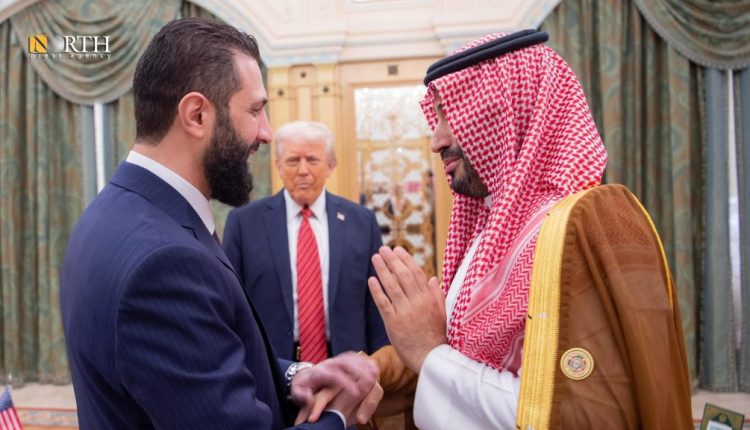Syria’s Transitional Leader Signals Openness to Joining Abraham Accords
By Kardo Roj
DAMASCUS, Syria (North Press) – In a groundbreaking diplomatic development, U.S. President Donald Trump revealed Wednesday that Syria’s transitional president, Ahmad al-Shara has expressed initial openness to joining the Abraham Accords—marking the first public hint that Damascus might normalize relations with Israel.
Speaking to reporters aboard Air Force One during his flight from Riyadh to Doha, Trump stated, “I told him [al-Shara] I hope Syria joins the Abraham Accords with Israel once things stabilize. He said yes. But they have a lot of work to do.”
This followed a historic meeting between Trump and al-Shar’ in Riyadh—the first of its kind between a U.S. and Syrian head of state in a quarter-century. Trump emphasized the U.S. is considering normalization with the new Syrian government, with Wednesday’s meeting marking the potential start of that path.
Abraham Accords and the Road to Regional Integration
The Abraham Accords, brokered initially in August 2020 under the Trump administration, are a series of normalization agreements between Israel and Arab nations including the UAE, Bahrain, Morocco, and Sudan. The inclusion of Syria—long aligned with Iran and hostile to Israel—would represent a dramatic shift in the Middle East’s diplomatic landscape.
Earlier this year, U.S. Special Envoy to the Middle East Steve Witkoff hinted at Washington’s ambitions for a broader normalization track. He stated in March that Syria and Lebanon could “potentially normalize ties with Israel,” suggesting that Damascus is increasingly perceived as having distanced itself from Iranian influence.
“If Syria and Lebanon normalize, and Saudi Arabia follows with a formal peace deal, we could be looking at a completely new landscape in the Middle East,” Witkoff said at the time.
Indirect Talks and Regional Channels
Reuters recently reported that the UAE has opened a backchannel between Syria and Israel to facilitate indirect talks. According to unnamed Syrian and regional intelligence sources, the discussions are centered on security arrangements and confidence-building measures. The contacts reportedly began shortly after al-Shara’s visit to the UAE on April 13.
While both Israel and Syria have refrained from official comment, the indirect nature of the negotiations—largely focused on technical and security matters—suggests that trust-building is underway before any political agreement is formalized.
During a joint press conference with French President Emmanuel Macron in Paris, al-Shara confirmed the existence of indirect negotiations with Israel via intermediaries, without naming them. “These talks aim to de-escalate and prevent a loss of control by either side,” he said.
Although the UAE officially denied mediating between Syria and Israel, Reuters cited regional intelligence sources who confirmed Emirati involvement, along with participation by current and former Israeli security officials.
Notably, these contacts occurred shortly before an Israeli airstrike near the presidential palace in Damascus, underlining the sensitive and volatile nature of the ongoing discussions.
Damascus Balances Regional Pressures
Since assuming the presidency during Syria’s transitional phase, Ahmad al-Sharش has taken deliberate steps to signal a shift from prior policies. His administration has engaged with Jewish communities domestically and abroad, and has taken action against factions such as Palestinian Islamic Jihad, detaining two senior figures following the October 7, 2023, Hamas-led assault on Israel.
This evolving posture is seen by analysts as an effort by the new leadership to demonstrate a pragmatic approach and distance Syria from armed groups traditionally aligned against Israel.
Meanwhile, a visiting U.S. congressional delegation arrived in Damascus this week, reportedly delivering direct political messages related to the Accords and broader regional realignments. Congressman Cory Mills said expanding the Abraham Accords remains a top priority for the Trump administration, and that Syria’s position could prove pivotal.
Looking Ahead: A Fragile Opening
While President Trump has expressed confidence in expanding the Accords, seasoned observers remain cautious. Former U.S. envoy James Jeffrey told Sky News that normalization talks tied to lifting sanctions remain speculative at best.
“Syria may be considering its options, but it’s too early to call it a turning point,” Jeffrey said.
With Syria at a crossroads and U.S. expectations mounting, the coming months could determine whether Damascus fully commits to reshaping its regional relationships—or remains tethered to past alliances. Either way, the implications for regional stability, especially for the U.S.-backed partners in northeast Syria, will be closely watched.
Additional Reporting by Ahmad Othman

